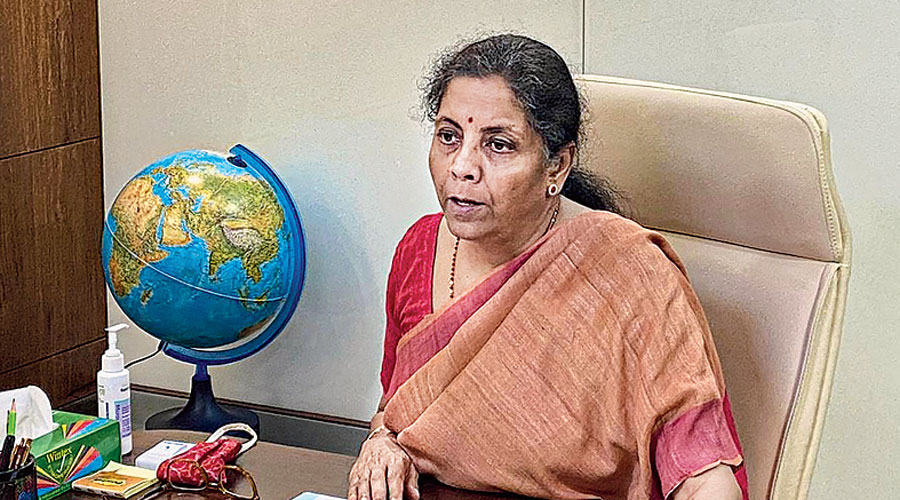The finance ministry will start its budget-making exercise for 2021-22 on October 16. The budget projections will be built around the special circumstances prevailing in the country as a result of Covid-19.
The expenditure decisions for individual ministries and department will be made by January 16. The pre-budget meetings will be held till the first week of November.
The finance commission is expected to submit its report on Centre-state finances and the new devolution formula by the end of this month — and the finance ministry will base its exercise around its recommendations.
“The Budget Estimates for 2021-22 will be provisionally finalised after the secretary (expenditure) completes discussions with the secretaries and financial advisers. Pre-Budget Meetings shall begin from 16th October 2020 and shall continue till the first week of November 2020,” according to a Budget Circular (2021-22) of the budget division of the finance ministry’s department of economic affairs.
“In the special circumstances of this year, the basis of the final budgetary allocations will be first and foremost overall fiscal position, and subject to that the absorptive capacity of the ministry/department. Using the trend in expenditure, approval of the schemes/projects by competent authority and committed expenditure, each ministry would project the requirements,” the circular said.
It will be the third budget (including an interim one) of both the Modi government — after its victory in the 2019 Lok Sabha polls — and finance minister Nirmala Sitharaman. Budget 2021-22 is likely to be presented on February 1.
The budget will have to address critical issues relating to the contraction in the economy and a subdued revenue collection triggered by the pandemic-induced lockdown and the gradual re-opening of the economy.
North Block officials said the exercise would be very difficult, including potential revenue collections and expenditure requirements to bring the economy back on its feet.
The budget meetings, according to the circular, will dicuss ceilings for all categories of expenditure, including central sector and centrally sponsored schemes.
In the April-June quarter of 2020-21, gross domestic product contracted 23.9 per cent. It is the first contraction in quarterly GDP data since their publication almost a quarter of a decade ago from 1998-99.
All the 2020-21 budget calculations made before the pandemic have gone for a toss, and the government was forced to announce a steep 54 per cent hike in its full-year gross market borrowing plan to a record Rs 12 lakh crore in just over a month into the current fiscal.
Recently, the finance ministry said it is not able to submit the rolling target of medium term expenditure framework (MTEF) for 2021-22 and 2022-23, according to the provisions of the Fiscal Responsibility and Budget Management Act.The ministry said because of the pandemic it was difficult to make reliable growth projections.
The Modi government has scrapped a colonial-era tradition of presenting the budget at the end of February. The then finance minister Arun Jaitley had for the first time presented the annual accounts on February 1, 2017.
With the advancement of the dates, the ministries are allocated their funds from the start of the financial year beginning April.
This gives government departments more leeway to spend as well as allow companies time to adapt to business and taxation plans.
As due to pandemic, it is difficult to obtain reliable protection of GDP growth.
The finance commission is expected to submit its report on Centre-state finances and the new devolution formula by the end of this month -- and the finance ministry will base its exercise around its recommendations.
"The Budget Estimates for 2021-22 will be provisionally finalized after the Secretary (Expenditure) completes discussions with the Secretaries and Financial Advisers. Pre-Budget Meetings shall begin from 16th October 2020 and shall continue till the first week of November 2020," according to a Budget Circular (2021-22) of the budget division of the finance ministry's Department of Economic Affairs.
"In the special circumstances of this year, the basis of the final budgetary allocations will be first and foremost overall fiscal position, and subject to that the absorptive capacity of the Ministry/Department. Using the trend in expenditure, approval of the schemes/Projects by Competent authority and committed expenditure, each ministry would project the requirements," the circular said.
The budget meetings, according to the circular, will dicuss ceilings for all categories of expenditure, including central sector and centrally sponsored schemes will be discussed.
Accordingly, the RE 2019-20 and BE 2020-21 for all categories of expenditure, and select schemes/projects specifically included in the MTEF (medium term expenditure framework) Statements, may be indicated separately for Revenue and Capital expenditure," the Budget circular said.
Recently, finance ministry said that it is not able to submit the rolling target of MTEF for FY22 and FY23, according to the provisions of the Fiscal Responsibility and Budget Management Act. As due to pandemic, it is difficult to obtain reliable protection of GDP growth.
Budget circular also proposed to discuss the totality of the requirements of funds for various programmes and schemes, along with receipts of the Departments (viz. interest receipts, dividends, loan repayments, departmental receipts, receipts of Departmental Commercial Undertakings, etc.) during the pre-budget meetings chaired by Secretary (Expenditure).
All the Ministries and Departments are required to submit details of all the Autonomous Bodies, for which a dedicated corpus fund has been created, clearly indicating the purpose, whether in Public Account, accumulated balances as on March 31, 2020, annual expenditure for the last three years and allocations made during the current financial year, it said.










